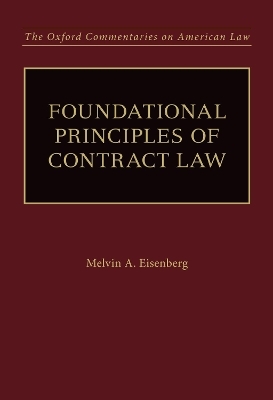
Foundational Principles of Contract Law
Oxford University Press Inc (Verlag)
978-0-19-973140-4 (ISBN)
Foundational Principles of Contract Law not only sets out the principles and rules of contract law, it places more emphasis on what the principles and rules of contract law should be, based on policy, morality, and experience. A major premise of the book is that the best way to grasp contract law is to understand it from a critical perspective as an organic, dynamic subject. When contract law is approached in this way it is much easier to grasp and learn than when it is presented simply as a static collection of principles and rules.
Professor Eisenberg covers almost all areas of contract law, including the enforceability of promises, remedies for breach of contract, problems of assent, form contracts, the effect of mistake and changed circumstances, interpretation, and problems of performance. Although the emphasis of the book is on the principles and rules of contract law, it also covers important theories in contract law, such as the theory of efficient breach, the theory of overreliance, the normative theory of contracts, formalism, and theories of contract interpretation.
Melvin A. Eisenberg is the Jesse H. Choper Professor of Law Emeritus at the University of California, Berkeley. After graduating from Harvard Law School summa cum laude, Eisenberg was with the New York firm of Kaye Scholer Fierman Hays & Handler. He also served as assistant counsel to the President's commission on the assassination of President Kennedy (Warren Commission) and as assistant corporations counsel of New York City. He joined the Boalt faculty in 1966. Eisenberg is the author of The Nature of the Common Law (1991) and The Structure of the Corporation (1997) and has published casebooks on contracts and corporations. He was Chief Reporter of the American Law Institute's Principles of Corporate Governance, an Adviser to the Institute's Restatement Third of Agency, Restatement of Restitution and Unjust Enrichment, and a member of the American Bar Association's Corporate Law Committee. He is presently an Adviser to the Institute's Restatement of Consumer Contracts. From 1991 to 1993 he held the American Law Institute's Justice R. Ami Cutter Chair. He was a Visiting Professor of Law at Harvard Law School in 1969, at the University of Tokyo in 1992, and at Columbia Law School from 1998 to 2009. He is a Fellow of the American Academy of Arts and Sciences and has been a Guggenheim Fellow and a Fulbright Senior Scholar. He holds honorary Doctor of Law degrees from Cologne University and the University of Milan In 1984 Eisenberg delivered the Cooley Lectures at the University of Michigan. He has also given lectures at a number of universities in the United States, Germany, Italy, England, Canada, Australia, New Zealand and Japan. In 1990 he was awarded the UC Berkeley Distinguished Teaching Award.
About the Author
Acknowledgments
Part I. Theories of Contract Law, Four Underlying Principles of Contract Law, and the Transformation of Contract Law from Classical to Modern
Chapter 1. The Objective and Coverage of This Book; Doctrinal and Social Propositions; Social and Critical Morality; Terminology; and the Tenor of the Footnote Apparatus
Chapter 2. Theories of Contract Law
Chapter 3. Four Underlying Principles of Contract Law and the Foundational Contract-Law Standard
Chapter 4. The Transformation of Contract Law from Classical to Modern
Part II. The Enforceability of Promises
Chapter 5. Bargain Promises and the Bargain Principle
Chapter 6. The Theory of Efficient Breach
Part III: Moral Elements in Contract Law
Chapter 7: The Unconscionability Principle
Chapter 8. Donative Promises
Chapter 9. The Duty to Rescue in Contract Law
Chapter 10. The Mitigation Principle
Part IV. Behavioral Psychology and Contract Law
Chapter 11. Behavioral Psychology and Contract Law
Part V. The Role of Fault in Contract Law
Chapter 12. The Role of Fault in Contract Law
Part VI. Expectation Damages
Chapter 13. The Building Blocks of Formulas to Measure Expectation Damages
Chapter 14. Formulas for Measuring Expectation Damages for Breach of a Contract for the Sale of Goods
Chapter 15. Formulas for Measuring Expectation Damages for Breach of a Contract to Provide Services
Chapter 16. Damages for a Purchaser's Breach of a Contract for the Provision of an Off-the-Shelf Commodity
Chapter 17. The Cover Principle
Chapter 18. The Certainty Principle
Chapter 19. The Principle of Hadley v. Baxendale
Chapter 20: Other Limitations on Expectation Damages: Litigation Costs, the Time Value of Forgone Gains, and the Risk of the Promisor's Insolvency
Chapter 21. The Theory of Overreliance
Chapter 22. Critiques of the Expectation Measure, and Alternative Damage Regimes
Part VII. Liquidated Damages
Chapter 23. Liquidated Damages
Part VIII. Specific Performance
Chapter 24. The Specific-Performance Principle: Actual and Virtual Specific Performance
Part IX. The Role of Restitution in Contract Law
Chapter 25. The Role of Restitution in Contract Law (with Mark Gergen)
Part X. The Disgorgement Interest in Contract Law
Chapter 26. The Disgorgement Interest in Contract Law
Part XI. The Elements of a Contract
Chapter 27. The Elements of a Contract: Expressions, Implications, Usages, Course of Dealing, Course of Performance, Context and Purpose
Part XII. Interpretation in Contract Law
Chapter 28. The General Principles of Contract Interpretation
Chapter 29. Objective and Subjective Elements of Interpretation
Chapter 30. Expression Rules
Part XIII. Contract Formation
Chapter 31. Offers
Chapter 32. Modes of Acceptance
Chapter 33. The Termination of an Offeree's Power of Acceptance
Chapter 34. Prizes and Rewards
Chapter 35. Implied-in-Law and Implied-in-Fact Contracts
Chapter 36. Incomplete Contracts
Part XIV. Form Contracts
Chapter 37. Form Contracts
Part XV. The Parol Evidence Rule
Chapter 38. The Parol Evidence Rule
Part XVI. Mistake, Disclosure, and Unexpected Circumstances
Chapter 39. Introduction to Mistake in Contract Law
Chapter 40. Evaluative Mistakes
Chapter 41. Mechanical Errors ("Unilateral Mistakes")
Chapter 42. Mistranscriptions
Chapter 43. Shared Mistaken Factual Assumptions ("Mutual Mistakes")
Chapter 44. Disclosure in Contract Law
Chapter 45. Unexpected Circumstances: Impossibility, Impracticability, and Frustration
Part XVII. Problems of Performance
Chapter 46. Introduction to Problems of Performance
Chapter 47. The Order of Performance: Constructive Conditions
Chapter 48. The Principle of Anticipatory Repudiation
Chapter 49. The Principle of Adequate Assurance of Performance
Chapter 50. Augmented Sanctions: Material Breach, Total Breach, and Opportunistic Breach; Cure; Suspension and Termination
Chapter 51. The Principle of Substantial Performance
Part XVIII. The Principle of Good Faith in Contract Law
Chapter 52. The Principle of Good Faith in Contract Law (with Mark Gergen)
Part XIX. Express Conditions
Chapter 53. Express Conditions
Part XX. Relational Contracts
Chapter 54. Relational Contracts
Part XXI. Third-Party Beneficiaries
Chapter 55. Third-Party Beneficiaries
Part XXII. Requirements of a Writing
Chapter 56. The Statute of Frauds
Chapter 57. No-Oral-Modification Clauses
Index
| Erscheinungsdatum | 22.10.2018 |
|---|---|
| Reihe/Serie | Oxford Commentaries on American Law |
| Verlagsort | New York |
| Sprache | englisch |
| Maße | 257 x 185 mm |
| Gewicht | 1719 g |
| Themenwelt | Recht / Steuern ► EU / Internationales Recht |
| Recht / Steuern ► Öffentliches Recht | |
| Recht / Steuern ► Privatrecht / Bürgerliches Recht | |
| Recht / Steuern ► Wirtschaftsrecht ► Handelsrecht | |
| ISBN-10 | 0-19-973140-3 / 0199731403 |
| ISBN-13 | 978-0-19-973140-4 / 9780199731404 |
| Zustand | Neuware |
| Haben Sie eine Frage zum Produkt? |
aus dem Bereich


